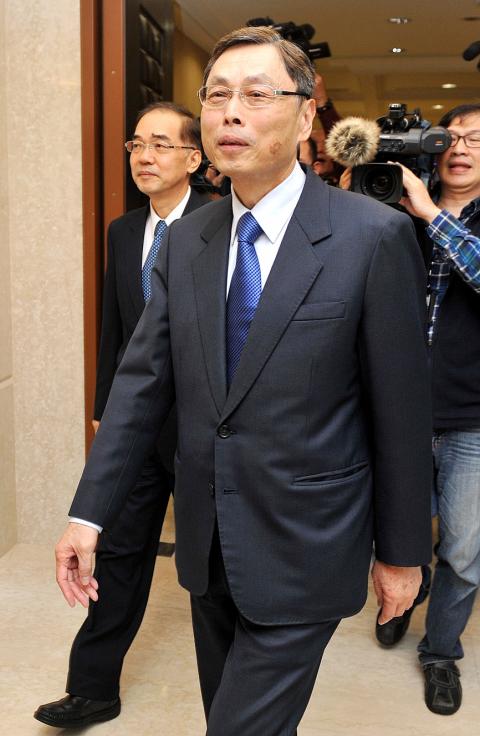Straits Exchange Foundation (SEF) Vice Chairman Kao Koong-lian (高孔廉) yesterday confirmed that he has tendered his resignation, and is to leave the post on Feb. 6, reportedly without a next posting in place.
Kao, who has held the SEF position since 2008, said he had long planned to retire from the foundation when former SEF chairman Chiang Ping-kung (江丙坤) resigned two years ago. He denied that his resignation was a result of problematic relations with SEF Chairman Lin Join-sane (林中森).
“I am honored to have been involved in cross-strait developments over the past 20 years. I have no career plans following my resignation and my retirement will bring a generational change to the field,” he said.

Photo: Chien Jung-fong, Taipei Times
Kao worked with President Ma Ying-jeou (馬英九) in the Executive Yuan handling cross-strait affairs when Ma served on the Research, Development and Evaluation Committee. Kao also served as deputy minister of the Mainland Affairs Council.
He yesterday thanked Ma and Chiang for their recognition of his efforts in cross-strait developments, and again said he did not have problematic relations with Lin.
The Presidential Office said yesterday that Ma had been briefed about Kao’s resignation last week, and Ma approved his resignation.
Kao said yesterday that he reached a consensus with the government that he would leave the post soon after Chiang’s resignation. He had offered his resignation in September last year, but did not leave for various reasons.
Lin yesterday also dismissed reports of a problematic relationship between him and Kao, and said Kao had told him about his retirement plans since he took over as chairman.
“Everyone knows that we have cooperated seamlessly and fulfilled our duties,” he said.
SEF Deputy Secretary-General Ma Shaw-chang (馬紹章) or National Policy Foundation committee member Cheng An-kuo (鄭安國) are thought to be likely successors to the post.

DAREDEVIL: Honnold said it had always been a dream of his to climb Taipei 101, while a Netflix producer said the skyscraper was ‘a real icon of this country’ US climber Alex Honnold yesterday took on Taiwan’s tallest building, becoming the first person to scale Taipei 101 without a rope, harness or safety net. Hundreds of spectators gathered at the base of the 101-story skyscraper to watch Honnold, 40, embark on his daredevil feat, which was also broadcast live on Netflix. Dressed in a red T-shirt and yellow custom-made climbing shoes, Honnold swiftly moved up the southeast face of the glass and steel building. At one point, he stepped onto a platform midway up to wave down at fans and onlookers who were taking photos. People watching from inside

A Vietnamese migrant worker yesterday won NT$12 million (US$379,627) on a Lunar New Year scratch card in Kaohsiung as part of Taiwan Lottery Co’s (台灣彩券) “NT$12 Million Grand Fortune” (1200萬大吉利) game. The man was the first top-prize winner of the new game launched on Jan. 6 to mark the Lunar New Year. Three Vietnamese migrant workers visited a Taiwan Lottery shop on Xinyue Street in Kaohsiung’s Gangshan District (崗山), a store representative said. The player bought multiple tickets and, after winning nothing, held the final lottery ticket in one hand and rubbed the store’s statue of the Maitreya Buddha’s belly with the other,

Japan’s strategic alliance with the US would collapse if Tokyo were to turn away from a conflict in Taiwan, Japanese Prime Minister Sanae Takaichi said yesterday, but distanced herself from previous comments that suggested a possible military response in such an event. Takaichi expressed her latest views on a nationally broadcast TV program late on Monday, where an opposition party leader criticized her for igniting tensions with China with the earlier remarks. Ties between Japan and China have sunk to the worst level in years after Takaichi said in November that a hypothetical Chinese attack on Taiwan could bring about a Japanese

MAKING WAVES: China’s maritime militia could become a nontraditional threat in war, clogging up shipping lanes to prevent US or Japanese intervention, a report said About 1,900 Chinese ships flying flags of convenience and fishing vessels that participated in China’s military exercises around Taiwan last month and in January last year have been listed for monitoring, Coast Guard Administration (CGA) Deputy Director-General Hsieh Ching-chin (謝慶欽) said yesterday. Following amendments to the Commercial Port Act (商港法) and the Law of Ships (船舶法) last month, the CGA can designate possible berthing areas or deny ports of call for vessels suspected of loitering around areas where undersea cables can be accessed, Oceans Affairs Council Minister Kuan Bi-ling (管碧玲) said. The list of suspected ships, originally 300, had risen to about